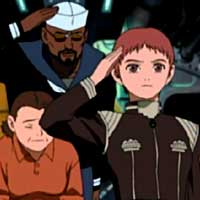by Luis Reyes
|
Heralded as one of the best to date, the dub recording for "Blue Submarine," produced at Coastal Carolina in North Carolina and directed by Scott Houle, features a host of veteran voice actors whose understated performances give deference to the anime while still packing in all the emotional intensity called for in Yamaguchi's script. Central to the dub's high quality is a cast led by anime fans. Michael Granberry, who played "Sub's" Maverick lead Hayami Tetsu, is a huge fan, whose favorite titles include "Trigun," "Cowboy Bebop" and anything by Miyazaki. It's finally time for a look at the plot. The most contentious element of "Blue Submarine," the story suffered the harshest criticism, weathering attacks for being confusing, boring and unbalanced. It is definitely a genre picture, a maritime, science fiction epic that includes futuristic technology in direct conflict with accelerated evolution. And it's message that humankind will lead to its own destruction, chimes well-played notes in anime. However familiar the premise, though, the plot could never be called unoriginal. Following the character of Hayami through his incurable apathy to his compassionate drive to discover Zorndyke's true intentions, Maeda and Yamaguchi force their lead into a moral decision for which any solution turns him into that which he most abhors. It all makes for a uniquely tragic ending. The most articulate critics agreed that the story was sound but too short. The pacing of the piece as it moves from an action film to a film with heavy philosophical overtones feels abrupt. And if its only legitimate offense is being too short, "Blue Submarine" successfully weaves a compelling tale.
Regardless of why fans gravitate toward "Blue Submarine No. 6," the project has made a lasting impression on not only the anime industry and fandom, but also the world. Bold, exciting, with the insight to take familiar themes into new terrain despite being pegged a 'technical achievement,' Maeda's achievement proves so much more than a sounding block for new technology. Granberry has this to say about the series: "The strength of the show lies in the director, Mahiro Maeda. It is beautifully paced, allowing very realistic timing and quiet scenes that reveal character, and the choreography of the action sequences serves as a stunning contrast. The character designs are attractive and intriguing, and the cast is made up of a great variety of racial and cultural representatives." In the hands of a first-time director and one who may pioneer a new facet of animated entertainment, Ozawa's vision was well worth the wait. |
||||
|
Blue Submarine No. 6 © Satoru Ozawa / Bandai Visual / Toshiba EMI / Gonzo / Bandai Ent. |

